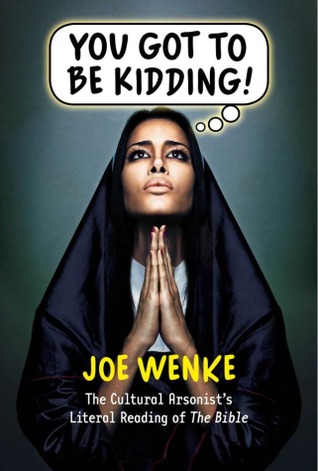Review: 'You Got To Be Kidding: The Cultural Arsonist's Literal Reading of the Bible' by Joe Wenke
 I requested this book from Netgalley ages ago because I thought it looked hilarious. I like to think of myself I'm pretty savvy with Bible knowledge so it was fun to see how my ideas matched up to Wenke's!
I requested this book from Netgalley ages ago because I thought it looked hilarious. I like to think of myself I'm pretty savvy with Bible knowledge so it was fun to see how my ideas matched up to Wenke's!Why did God turn Lot's wife into a pillar of salt? Were there no other seasonings available? Why don't we know anything about the early years of Jesus? Did someone lose his baby book? Who reported the desert encounter between Jesus and Satan? Jesus-or Satan? And why does the Holy Spirit like to show up as a bird?
As irreverent as the musical The Book of Mormon, Joe Wenke's YOU GOT TO BE KIDDING: The Cultural Arsonist's Literal Reading of the Bible is an engaging, provocative and hilarious investigation into the bestselling book of all time. Written to "cause trouble" cultural arsonist Wenke, a keen observer of human gullibility, tempts readers to more closely examine the stories they think they know about the Bible.
Drawing upon the same pool of incendiary and cerebral humor as Bill Maher, Jon Stewart and the late, great George Carlin, YOU GOT TO BE KIDDING is a call for humor to restore our sanity and our ability to think for ourselves. Just as it was written in the Bible-or was it?There is probably a big difference in reading experience when you're reading this as a Christian/believer or an atheist, and even then there is of course the distinction in how you believe in the Bible. For me what the Bible says was always, to quote Barbossa, more 'guidelines than actual rules'. In a modern day world it makes no sense to follow the advice from a book that is almost 2000 years old. Before I launch into stating how hilarious an enjoyable a book this is I want to pick up on one aspect that always disappoints me in these kinds of books. It seems that the authors of these books only believe in one kind of Bible readership who believes the Bible was written by God and simply dropped down from Heaven like it is now. Rather than discussing the Bible as a "book" and looking at its origin, many authors assume everyone believes in every single word. I understand why they do it. Taking it serious makes it much easier to make fun of some of its aspects. (I understand that Wenke intentionally created a Literal Reading of the Bible, so this doesn't necessarily apply to him although I would have liked seeing some thoughts regarding it at the beginning or the end of the book.)
The Bible such as we have it now was never one, uniform thing. The Old Testament is as much a (very subjective) religious history book for the Ancient people of Isreal. Christianity adopted it and its order from Judaism. The New Testament is in many ways a collection of texts, gospels, that was put together in order to create a uniformity of message for Christianity. It's arguable whether it was discussed at all during the Nicean Council in 325 AD. Although by then the texts, and many others, had already been written, the Council settled a lot of theological debates and standardizes certain ideas. The creation story of the Bible is relatively important when thinking about it or discussing it. The fact that Wenke picks up on irregularities and lack of continuation at times is because it is not a continuous work. The differences between Old and New Testament, in how God is represented for example, are also due to the fact that one is Judaic whereas the other is very much Christian. There are two different cultures, histories and purposes to these Testaments.
Putting this little irritation aside, Wenke's book is really funny. Going through the Bible book by book he picks up on some of its aspects quite hilariously. Discussing the strange behaviour of God at length, he not only makes funny jokes but also some genuine points. The Old Testament isn't read enough, I think, and some aspects of it are beyond ridiculous. Let's not even get into Leviticus. What I do think is a shame is that Wenke doesn't mention or pick up on the strong sense of tradition that exists in the Old Testament. The sense of repetition he criticizes at times is a way of connecting different generations together and I often find myself loving the archaicness of its language. Slightly related to the points made above, Wenke takes the stories at face-value and treats them as factual, or at least as being meant to sound true. Naturally, each story in the Bible is exactly that: a story. There is a deeper meaning behind it, it's a parable through which morals are illustrated. How questionable these morals are can always be discussed, however, one has to analyse the parable for being so in order to get to those morals.
I give this book...

3 Universes.
I found Wenke's book hugely entertaining. It was a fun read that I didn't want to put down till the very end. However, I doubt I'll ever reread it because once the jokes are known they're no longer that funny. Wenke picks up on some really interesting points but doesn't develop them and in the end it is therefore nothing more than a funny book.



Comments
Post a Comment